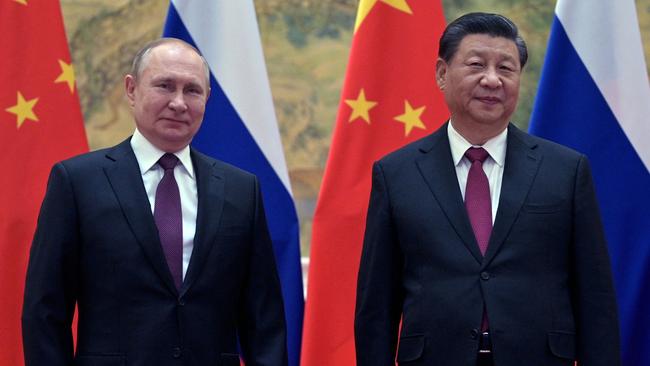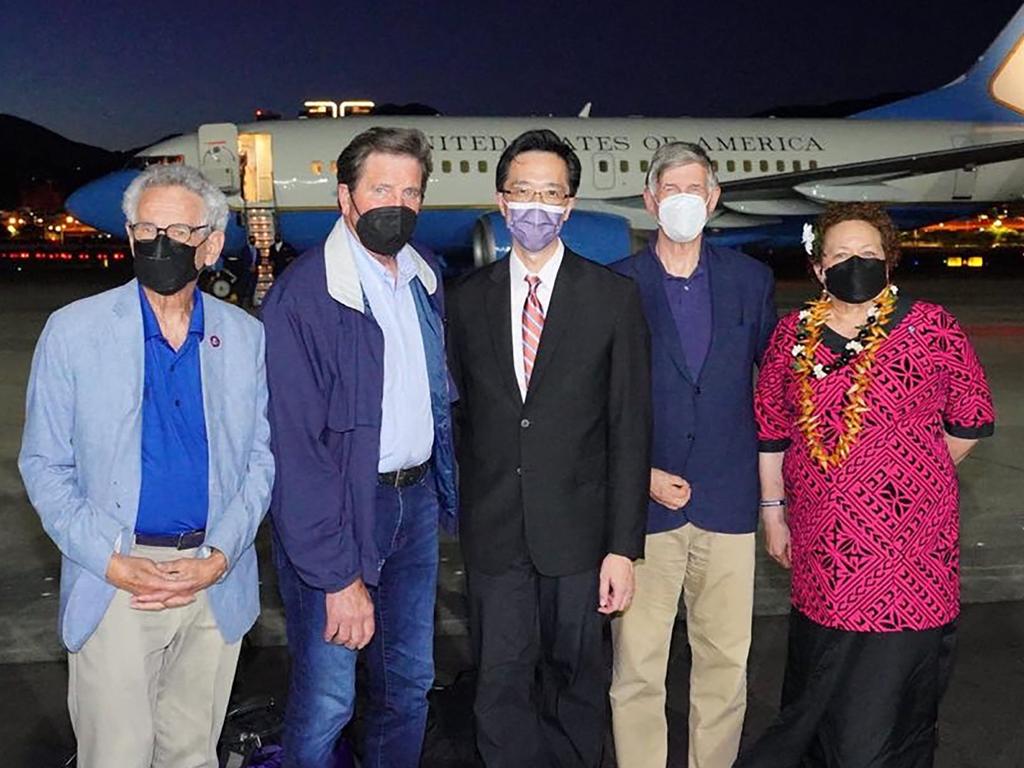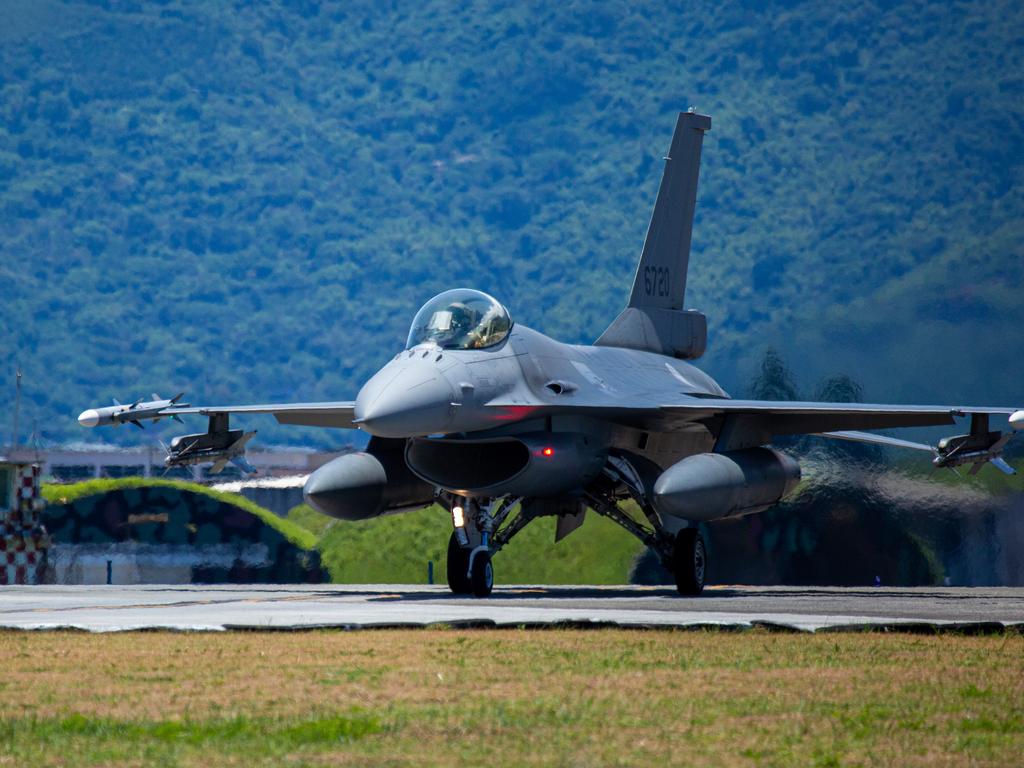
And to a great extent, that was true. Yet despite the obvious benefits of more liberal economies, more accountable governments, and more pluralist societies, history didn’t stop, human nature hasn’t changed and there are still people determined to impose their vision on others, by force if necessary.
The war in Ukraine has made us confront this grim reality, in a way Islamism never quite did; and the “no limits” partnership between the new tsar in Moscow and the new emperor in Beijing means it’s not just in eastern Europe that dictators are on the march.
Naturally we’d all rather continue the life we’d grown used to: consuming ever better services, expecting ever more material comfort and moving ever more freely around a world that was smaller and friendlier.
But that’s not how Vladimir Putin or Xi Jinping see things: one yearns to restore greater Russia and the other aches to make China the world’s top power, and if that’s not to the liking of the people of Ukraine, or of Taiwan, or of anywhere else, that’s just too bad.
If there’s one lesson from Russia’s entirely unprovoked and utterly unjustified attack on Ukraine, it’s that weakness is tempting and that a small country that seems to be on its own is at risk of being gobbled up.
Putin unleashed what he thought would be a lightning strike to decapitate the leadership and reclaim the country as a Russian satellite. Only now it’s bogged down in a grinding war of attrition that can probably be resolved well only by much more Western weaponry or badly by Russia – to use its military parlance – escalating to de-escalate.
So far, the democracies are giving the Ukrainians enough to keep them fighting but not enough to give them victory. So they go on, alone, fighting for our freedom too, increasingly with our weapons and with us urging them on, but not too far.
Best would be for the democracies to give the Ukrainians the more powerful weapons they need to recover all their lost territory, while warning Putin that any use of nuclear weapons would mean the immediate admission of Ukraine to NATO and Western troops on the Dnipro.
Watching all this are the commissars in Beijing, whose determination to end the “century of humiliation” and to claim Taiwan more than matches Putin’s to restore the Russia of Peter the Great.
While America has been distracted by its “forever wars”, China has quietly been building the world’s largest navy, backed by the world’s largest coastguard, and a vast maritime militia of fishing boats under military direction.
This is the most ominous problem the world now faces – worse even than the Ukraine war because if communist China takes Taiwan, with or without US resistance, it’s the end of the US alliance system and the end of the US-led global order that had given the world, pre-Covid, quite literally, the best times in history, with people richer, freer and safer than ever.
As senator and former general Jim Molan has just said in his new book: “to conclude that war is so appalling that it could never occur or that the probability is small enough to be ignored” is a dangerous delusion. To take Taiwan and to drive the US from the western Pacific, Molan thinks the Beijing regime is considering a Pearl Harbor-style sneak attack using its rocket force to destroy all the US bases and all the carrier strike groups in the western Pacific. Provided the US shrinks from retaliation with a counter-strike against bases in China to even the score, the Molan thesis has Taiwan with no option but to accept incorporation into China, Hong Kong-style and Japan, South Korea and Australia left with the miserable choice of fighting an unequal war or accepting tributary status.
For the status quo to be maintained, which it must – for 23 million Taiwanese to stay free and for a cataclysmic war to be avoided – China has to be convinced, really convinced, that no attack is worth it. In other words, China must be made to know that a strike on US bases would invite instant massive retaliation and that an attack on Taiwan would be resisted not just by the Taiwanese but also by the US and its allies.
Yet that is precisely what the current policy of strategic ambiguity fails to do.
Changing anything, even just the rhetoric, is perilous; yet changing nothing invites the Chinese to conclude that America has lost its will to uphold the global order, especially after the scuttle from Kabul, and especially after the Middle Kingdom has managed to abrogate the “one country, two systems” treaty on Hong Kong and to militarise the South China Sea without any adverse consequences.
Plainly what’s needed is a rapid resurgence of the democracies’ military power, economic strength and cultural self-confidence, yet it’s hard to see any of this being led from Washington, where the administration is focused on correcting perceived racial injustice, even though minorities have never had a fairer go; and combating what it calls a climate emergency, even though there’s a looming strategic emergency that could kill millions and impoverish billions, far more surely and far more quickly than a couple of degrees of global warming a few decades hence.
Should cutting emissions remain the world’s highest priority when it has the practical effect of making the democracies relatively weaker and dictatorships relatively stronger? Just to pose the question, I think, gives the answer.
Global and regional leadership can’t just be left to an America in relative decline.
Japan needs to take its rightful place as the main democracy of the western Pacific, without unique restrictions on its armed forces. India needs to hasten its emergence as the second democratic superpower in a world that sorely needs another strong force for good. Britain needs to make Far Eastern deployments, like last year’s by HMS Queen Elizabeth, routine events. And Australia needs to end decades of strategic complacency, because leaving the heavy lifting to others is unworthy and unwise.
There are yet grounds for hope. After two dispiriting years of pandemic, when safety came first and freedom came last, comes the most glowing example of national heroism since Britain and its empire stood alone against the Nazis; and – likewise – if Ukraine lasts for a thousand years, men should still say “this was their finest hour”.
The whole Ukrainian people are placing their freedom, and their independence, ahead of their comfort, their safety, and even their very lives, if henceforth these were to be eked out in a Russian-slave-state.
From President Zelensky scornfully refusing the American offer of a chopper ride to safety, to the young conscript sacrificing himself to blow up a bridge to stop a Russian advance, to the countless men escorting their families to the border only to return to combat themselves, the Ukrainians have shown the world what love of country really means.
If those who had known so little of freedom value it so much, perhaps we, who have taken so much of it for granted, might see again how precious it is before that’s too late.
This is an edited extract from a speech Tony Abbott made to the Henry Jackson Society in London on Tuesday.






When the Berlin Wall came down, when the old Soviet Union broke up, and when communist China appeared to have embraced market capitalism, the general expectation was that conflict between major nations was a thing of the past, that nearly everyone just wanted a materially better life, and that all governments would mainly be focused on helping their citizens.